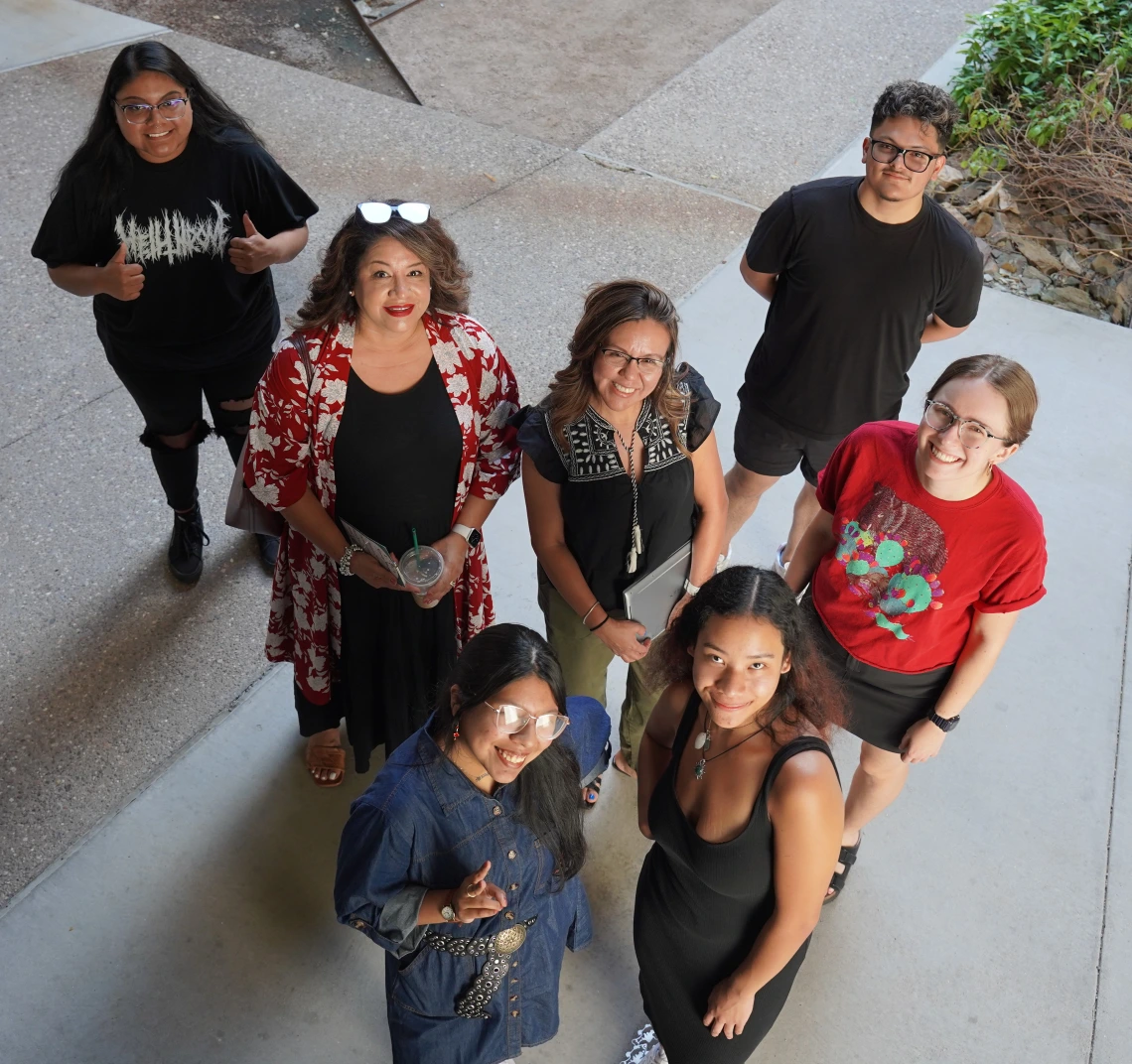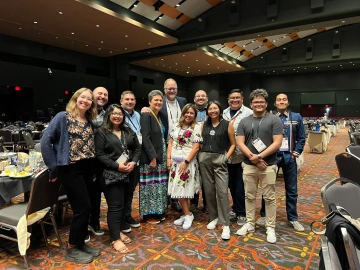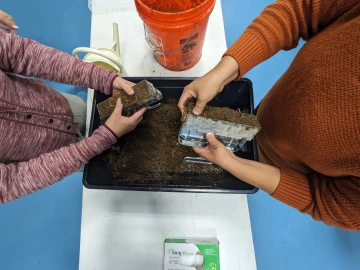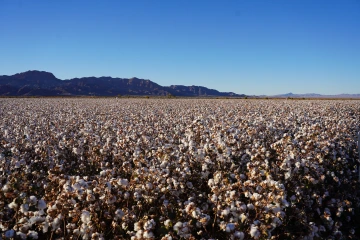IRes in AZ and Abroad

IRes team members planning for the Grand Opening
The Indigenous Resilience Center (IRes) has been sharing our work across the state and outside of the United States. We are excited to share our annual report on our website.

SACNAS
Recently, IRes joined the Society for Advancement of Chicanos/Hispanics and Native Americans in Science (SACNAS) which was held this year in Phoenix, AZ. IRes led an interactive panel session called, “Indigenous Research Methodologies in Community-Based Food, Energy, and Water Projects in Indigenous Communities” with Dr. Ren Freeman and all of the IRes core faculty members: Dr. Karletta Chief, Dr. Cherie DeVore, Dr. Joe Hoover, and Dr. Michael Johnson.
IRes student, Aracely Rodriguez, shared about her experience at SACNAS, "As a first-time attendee of the SACNAS conference, being able to participate and experience such a huge event was very impactful and exciting! I had the opportunity to attend some inspiring talks and panels while also being in a culturally rich environment. As a student currently in an Arts major, attending this STEM conference still offered me just as many opportunities and allowed me to connect with so many amazing people!"
Presentations
Other recent presentations have included: Dr. Michael Johnson giving a TED Talk at Centennial Hall, IRes team members presenting at STAR School, and hosting a presentation at AISES called, “Native FEWS Student Success: Reflections of the Native American/Indigenous Student Experience in the Nexus of Food, Energy, and Water Systems.”

AISES
The IRes team participated in the American Indian Science and Engineering Society (AISES) conference in San Antonio, Texas. The day before AISES began we joined the Native FEWS Alliance (NFA) preconference.
IRes Program Coordinator, Bernice Rodriguez shared about the IRes/NFA panel, “At the 2024 National AISES Conference, the Native FEWS Alliance hosted a Student Panel, moderated by our Graduate Assistant, Trinity Norris. Trinity guided the discussion by asking students to share their experiences in various Native FEWS Alliance programs, including the "A Student's Journey Program" and the “Native FEWS UC Berkeley Program.” Their insightful responses highlighted the impact these opportunities have had on their academic and professional growth. Additionally, members of our team had the chance to volunteer during the conference. I had the pleasure of assisting with the High School STEM Day setup, where I saw the dedication required to create such an engaging environment. Watching students build robots and fly mini drones was a rewarding highlight of the day."

STAR School
LaCher Pacheco and Ruth Pannill facilitated a workshop at STAR School with collaborators from NMSU, NAU and AIHEC.
The workshop focused on Traditional ecological knowledge and organic soil curricula. They listened to stories about the six cardinal directions (South, East, West, North, Zenith and Nadir) and recognized two additional directions to help foster social emotional learning practices for community gardening.
LaCher (Pueblo), a student intern for the University of Arizona Community Garden and IRes Graduate Assistant, led a soil mold making activity which prompted discussion about Agri-Research, such as Dirt having fewer living organisms and Soil having more living organisms. The University of Arizona Community Garden provided the molds and organic soil for teachers to plant fall vegetables. New Mexico State University Agri-Researchers Brandon (Dine) and Emiliano (Shoshone) were able to share their Indigenous knowledge about soil from their respective tribes. Brandon shared his knowledge about Dry Farming and Emiliano shared his research project about Agrivoltaics and Botany. As a team, they were able to create a mini lesson about soil, Tribal epistemologies, and how we come to know our locations, and learned about the importance of creating safe learning spaces where students and their educators can share traditional ecological practices.
Mexico
An exciting recent development was IRes team members traveling to Mexico City.
Dr. Karletta Chief and Tina Gargus participated at the Waverley Street Foundation's inaugural Cultivating Community 2024 global grantee partner gathering held in Mexico City on October 15-17. The convening brought together over 250 grantee partners for an inspiring time of connection, collaboration, and vision-building for the future.
The Waverley Street Foundation invests in community-led programs that will help us grow better food, preserve our farmland, get cleaner, more affordable energy, build smarter, more successful businesses, and cultivate a healing planet.
Celebrating with Community
IRes has had the honor of celebrating with our community partners. IRes joined the O'odham Taṣ celebration at TOCC and met with the Haury board during their 10-year Anniversary Celebration. We gathered with partners across campus for Indigenous People’s Day which was organized by Trinity Norris and Nona Little Owl.

VISIT to CRIT
Chairwoman Amelia Flores extended an invitation for the Indigenous Resilience team to visit the Colorado River Indian Tribes (CRIT) reservation to learn more about the Tribe and discuss potential opportunities for collaboration. The meeting schedule was coordinated through the UA Tribal Cooperative Extension office in Parker, AZ.
The visit included:
• Meeting with CRIT Chairwoman, Amelia Flores about potential collaborations
• Meeting with CRIT Library & Archives Director, Gilford Harper regarding the history and infrastructure of the CRIT reservation.
• CRIT Museum Tour
• IRES Hosted Lunch with Chairwoman Amelia Flores, Vice Chairman Dwight Lomayesva, Councilwoman Vanessa Olivares, CRIT Farm Manager Joshua Moore, and Cooperative Extension FRTEP Agents, Debbie Pettigrew and Don Alamban.
• CRIT Food Distribution Center Tour with UA Cooperative Extension
• La Perla Community School Garden Tour with Don Alamban
• CRIT Farm Tour and Meeting with Joshua Moore, CRIT Farm Manager
As we honor Native American Heritage Month, we recognize the importance of learning from Tribal Nations. Meeting with the CRIT Tribal Council, touring farms, and experiencing cultural centers reinforced the need to center Indigenous Knowledges.
Honoring Dr. Francine C. Gachupin
On Friday, November 22nd from 2-4 pm, we will honor the life of Dr. Francine C. Gachupin. Dr. Gachupin was a friend and supporter of the Indigenous Resilience Center. Dr. Karletta Chief shared her thoughts,
“Today we honor the life of Dr. Francine Gachupin and celebrate her impact on our lives. I met Dr. Francine Gachupin when I first came to UArizona in 2011. We were one of a handful of Junior Native Faculty. I am honored to have known Dr. Gachupin and to work with her. Her kindness, intellect and commitment to community spread through the entire Native American community. Dr. Gachupin was instrumental in starting the Native Faculty Association in 2012. We worked together to get it off the ground with the help of Dr. Karen Francis-Begay. Back then, it was the Native Junior Faculty. We had luncheons and met to support each other. Francine was able to secure grants, analyze the Native faculty demographics, and put the information on the website. Francine's leadership as President of UANF resulted in building a community of Native academics at UArizona. She has always been very supportive of Native faculty and was always willing to mentor and encourage others. She and I worked together on our dossiers back in 2016. We met weekly to work on it and support each other in its submission. I was honored to get to know her through that peer support group and to spend many weeks discussing our work with our communities. My deepest condolences to her family and the community. This is such a huge loss. I am so saddened that she is gone but I honor her life and her commitment to the Native American community.”
